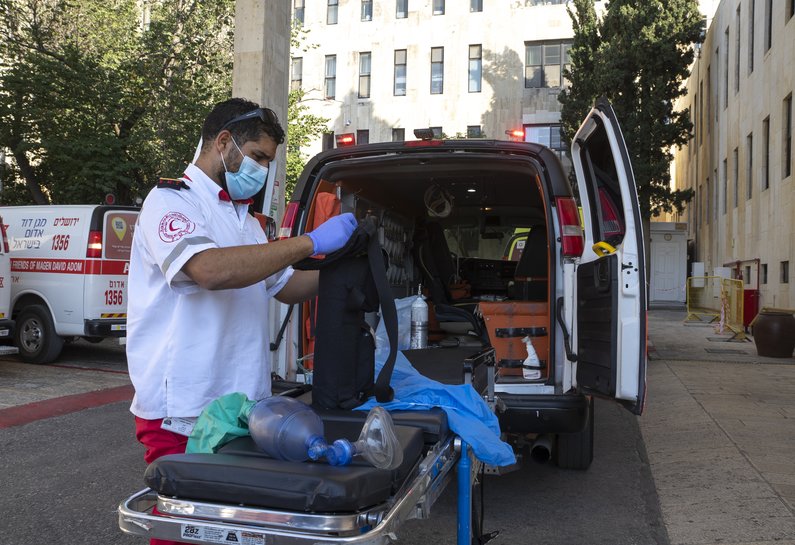International community must urgently protect Palestinian medical personnel and facilities

Dear H.E. Ambassador,
As a group of health and humanitarian organisations, we are writing to urge you to use the UN Security Council open debate on the protection of civilians in armed conflict on 23 May to highlight and condemn attacks and violations against Palestinian healthcare workers and medical infrastructure.
In line with commitments made by Member States in UNSC Resolution 2286 (2016), urgent action is needed to bring an end to pervasive violations of international law against Palestinian healthcare, by ensuring that incidents are independently investigated and those responsible held to account.
Palestinians across the occupied Palestinian territory are experiencing a significant escalation of Israeli military and settler violence this year, resulting in the killing of 152 people, including at least 20 children. The health and humanitarian systems are struggling to cope amid a lack of basic resources, waning international aid, and the multifaceted restrictions of Israel’s occupation.
Meanwhile, attacks and obstruction against health workers seeking to help the injured have risen significantly. The World Health Organization (WHO) recorded 187 attacks on healthcare in 2022, including physical assaults; targeting with live ammunition, tear gas and other weapons; and obstruction of access to and evacuation of wounded people. In the first five months of 2023, the WHO has recorded 99 attacks on healthcare, an almost 40% increase compared with the same period last year. Specific incidents reported this year by the Palestine Red Crescent Society (PRCS), one of the main providers of emergency medical response in the occupied Palestinian territory, include:
- Israeli forces denying PRCS ambulance access to a two-year-old girl with a heart condition suffering tear gas inhalation during a raid on the city of Nablus on 22 February. Ambulance crews had to rush to the child’s home on foot, where they were shot at and unable to safely evacuate her to the ambulance for 40 minutes.
- Israeli settlers and soldiers obstructing PRCS emergency teams from accessing wounded people during a settler attack on the village of Huwara on 26 February, damaging ambulances and physically assaulting staff.
- Israeli soldiers mounting a weapon on the bonnet of a PRCS ambulance and using it as cover and a firing position during a raid in the city of Tulkarem on 30 March.
- Violence and obstruction by Israeli forces against PRCS medics and ambulances attempting to treat those injured during the raid on the Al Aqsa compound in Jerusalem on 5 April. One PRCS paramedic was assaulted, and two ambulances damaged.
As an Occupying Power, Israel is required under Articles 55 and 56 of the Fourth Geneva Convention to ensure the adequate functioning of health services in occupied territory and allow medical personnel to carry out their duties. Article 20 requires that “personnel engaged in the search for, removal and transporting of and caring for wounded and sick civilians, the infirm and maternity cases, shall be respected and protected.”
These most recent incidents reflect a persistent and clear pattern of attacks on Palestinian healthcare over many years, and Israel’s disregard for its obligations under international law. Israeli authorities have consistently failed to conduct genuine investigations into attacks on healthcare, including those perpetrated during its 2014 assault on Gaza in which 17 hospitals, 56 primary healthcare centres and 45 ambulances were damaged and 16 health workers killed; its widespread use of excessive force in the context of the ‘Great March of Return’ protests in Gaza in 2018-19 in which three health workers were killed and hundreds injured; and its 2021 assault on Gaza in which at least 30 healthcare facilities were damaged including hospitals, clinics, and a medical laboratory. As established by the 2019 UN independent Commission of Inquiry, “the Occupied Palestinian Territory is one of the most dangerous places in the world to be a health worker”.
The ongoing failure of the international community to puncture impunity has helped fuel these violations, ensuring paramedics and ambulance teams remain in the firing line. This not only directly endangers health workers and civilians in the occupied Palestinian territory, but further erodes the protection of these groups in all other conflict contexts and emboldens impunity globally. No country must be permitted exemptions to the rule of international law.
Immediate action is needed to protect Palestinian civilians and healthcare personnel and make it clear to the government of Israel that further violations will be met with meaningful diplomatic and political consequences. We therefore urge you to express condemnation of these attacks on Palestinian healthcare at the upcoming Security Council debate on the protection of civilians in conflict. We also ask that you work with Member States to support genuine investigations into, and legal accountability for, all potential serious violations of international law in the occupied Palestinian territory, to ensure an end to the chronic impunity that allows such violence to endure.
Yours sincerely,
Melanie Ward, Chief Executive, Medical Aid for Palestinians
Guy Shalev, Ph.D., Executive Director, Physicians for Human Rights-Israel
Christina Wille, Director, Insecurity Insight
Photo: A Palestine Red Crescent Society health worker (Credit: William Parry).

